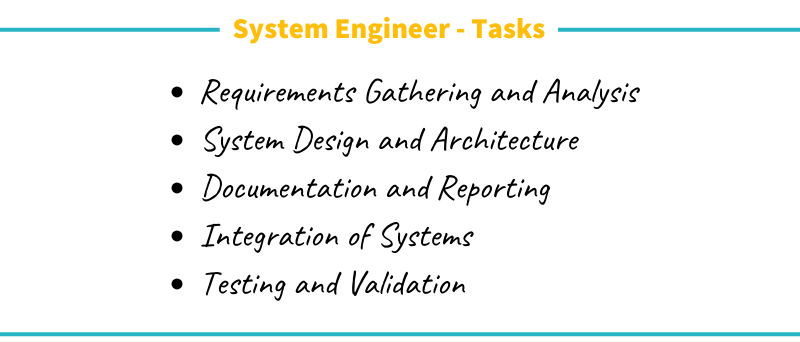Systems engineers play a crucial role in the smooth operation and development of complex systems across a variety of sectors. From ensuring reliable infrastructure in IT environments to designing manufacturing systems and implementing control configurations, the role of a systems engineer is integral to modern engineering solutions. This article delves into what it means to be a systems engineer, the skills and education required, and the types of job opportunities available in this exciting field.
What is the article about?
What is Systems Engineering?
Systems engineering is a branch of engineering, focused on designing, integrating, and managing complex systems throughout their lifecycle. Unlike traditional engineering roles, which may specialise in a particular type of technology or component, systems engineering encompasses a holistic view, ensuring that all elements of a system work together efficiently and effectively.
The field of systems engineering focuses on ensuring that complex systems function seamlessly. It begins with defining clear requirements for individual systems, determining what they need to achieve and how they fit within larger objectives. Engineers then apply advanced design concepts to develop solutions that are both efficient and safe, often incorporating tools and techniques from software engineering to enhance system performance.
A critical part of this work is managing the interaction between technical components and the people who will use or maintain the system. By addressing both technical and human factors, systems engineers ensure that everything works together in harmony to deliver reliable and effective results.
Key Areas of Focus in Systems Engineering
For those new to the field or looking to enhance their understanding of systems engineering, it’s essential to familiarise yourself with some core areas:
- Systems Engineering Process: This encompasses the lifecycle of a system, from concept to deployment, focusing on defining requirements, designing, and validating each phase of development.
- Design and Configuration Management: Design stages are critical in systems engineering, where engineers conduct design trade studies, evaluate possible solutions, and document configuration baselines. Effective configuration controls are essential to ensure systems remain consistent and adaptable over time.
- Reliability Engineering: Systems engineers often work to increase system reliability, ensuring each element functions correctly and efficiently. This field is crucial in industries like manufacturing and aerospace, where operational reliability can significantly impact safety and performance.
- Control Systems Engineering: Many systems engineers specialise in control systems, which are integral to automated and manufacturing processes. Control engineers design solutions to ensure that machines and software work in harmony, maintaining optimal performance.
- Management Processes: Systems engineering involves extensive technical management, including project management, program management, and closer management control of system elements. This helps ensure that systems function as expected within time, budget, and scope constraints.
- Decision Analysis Techniques: With systems becoming more complex, engineers frequently use decision analysis techniques to evaluate trade-offs and choose the best design solutions. Techniques such as complex decision analysis, decision matrices, and multi-criteria decision-making are crucial for managing dynamic systems effectively.

Skills Required for a Systems Engineer
The role of a systems engineer requires a blend of technical and management skills. Some essential competencies include:
Problem-Solving and Analytical Skills: Systems engineers must often navigate complex systems with interconnected elements. Being able to analyse these systems and troubleshoot issues is essential.
Project and Program Management: As systems engineers frequently lead large-scale projects, experience in project management or program management is highly valuable. Many professionals use methodologies like Agile and Lean to streamline project execution.
Hands-On Experience in Relevant Technologies: Whether working with physical systems in manufacturing or IT infrastructure as a Cloud Engineer, hands-on experience with the tools and technologies of the industry is critical. Azure Infrastructure Engineers, for example, benefit from a solid understanding of Microsoft’s cloud environment.
Strong Foundation in Engineering Principles: A degree in systems engineering or a related field such as electrical or control engineering is often required. Many UK universities offer undergraduate and master’s degrees in systems engineering, providing a solid theoretical and practical foundation.
Education Pathways and Career Development as a Systems Engineer
A career in systems engineering typically begins with a degree in systems engineering, control engineering, or a related field. Many systems engineers hold undergraduate degrees in electrical engineering, computer science, or mechanical engineering and later specialise in systems engineering through postgraduate courses or on-the-job training.
As systems engineers progress, additional certifications in project management or specialised areas, such as IT Infrastructure Library (ITIL) or cloud certifications (AWS, Azure), can enhance career prospects. For those seeking roles in project or program management, certifications in PRINCE2 or Agile methodologies may also be beneficial.
Career Opportunities for Systems Engineers in the UK
The UK job market offers a wealth of opportunities for systems engineers, spanning industries like IT, aerospace, manufacturing, and defense. Whether you’re aiming for a traditional career path or exploring the flexibility of freelancing, there’s no shortage of options to suit your skills and interests.
- Windows System Administrator: In IT environments, system engineers often work as system administrators, managing and optimising network and server infrastructures.
- Azure Infrastructure Engineer: With the rise of cloud computing, demand for engineers skilled in Azure infrastructure is increasing. These professionals manage virtual environments and ensure security, scalability, and reliability in cloud systems.
- Control and Automation Engineer: For industries reliant on automated systems, control engineers design, monitor, and optimise control systems within manufacturing or process-driven environments.
- Reliability Engineer: In fields such as aerospace and transportation, reliability engineers focus on minimising risks and ensuring all systems meet stringent safety standards.
- Systems Engineer in Defence and Aerospace: In the defence sector, systems engineers work on the design and integration of complex systems such as radar, surveillance, and communication systems, ensuring they meet high standards for reliability and security.
Freelancing in these fields is also a growing trend, giving skilled professionals the chance to work on diverse projects, choose their clients, and enjoy greater control over their schedules. With such a broad range of roles, systems engineering offers exciting possibilities for professionals at every stage of their career.
Conclusion
Systems engineering is a dynamic, multidisciplinary field offering UK professionals a rewarding career path with diverse opportunities. Whether managing large-scale cloud infrastructure or ensuring the reliability of automated manufacturing systems, systems engineers are at the forefront of technological innovation and operational excellence. For those with strong problem-solving abilities, an aptitude for both design and management, and a passion for complex systems, this could be an ideal career to explore.


